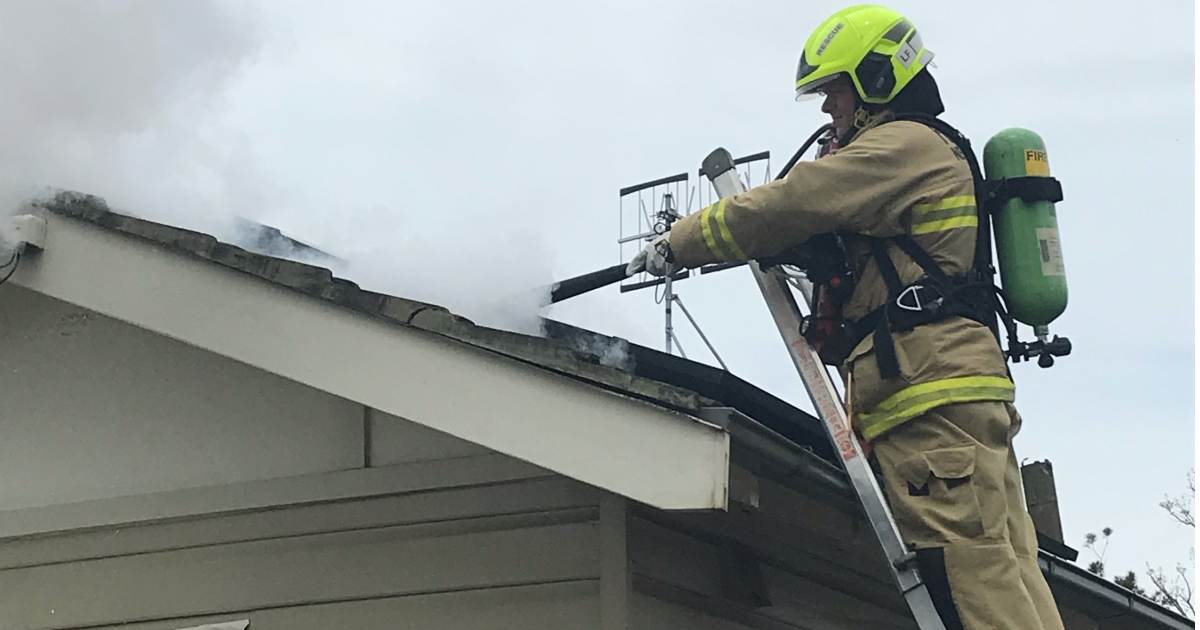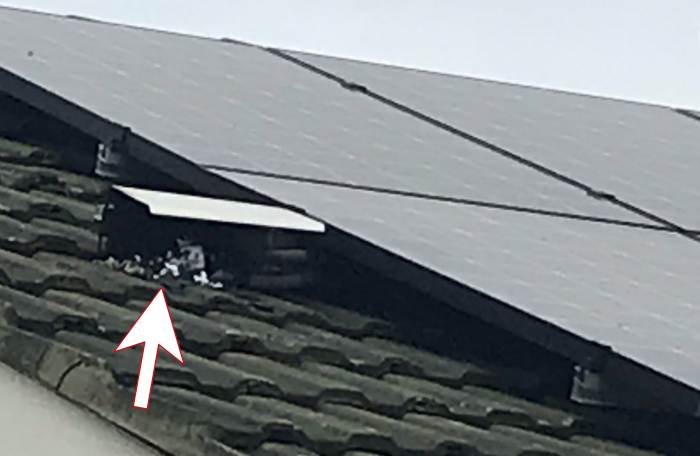
Image: FRNSW
A problem child of solar installations – rooftop DC isolators – are continuing to demonstrate why they should no longer be required.
Early yesterday afternoon, Fire and Rescue NSW crews attended a residence in the Newcastle suburb of New Lambton following reports of a house fire. Crews arriving on the scene found a “solar panel isolation switch” on the roof of the home had caught fire.
FRNSW says fire-fighters were able to quickly extinguish the fire and prevent it from spreading into the roof. It looks as though there was no other damage except to the isolator:

A rooftop DC isolator is a switch situated adjacent to a solar panel array intended as an additional safety mechanism. Manually operated, the switch shuts off DC current between the solar panels and the solar inverter. However, these little boxes are one of the most common single causes of rooftop solar system fires.
There wasn’t any further information about the affected system, such as how old it is (DC isolator quality has generally improved) and whether inspections were kept up. In this instance, the isolator was somewhat protected from the elements by a shroud – unprotected DC isolators are subject to particularly harsh conditions.
Rooftop DC Isolators Despised, But Required (For Now)
Generally speaking, installers intensely dislike rooftop DC isolator switches. There has been a push to have the blasted things removed from the AS/NZS 5033 Standard for years, but the wheels of standards tweaking can move very slowly.
While AS/NZS 5033 also applies in New Zealand, NZ installations do not require rooftop isolators. To the best of my knowledge, Australia is the only country in the world where the devices are compulsory.
In June last year, Clean Energy Council members gave in-principle support to also do away with wall-mounted DC isolators; instead requiring the use of an isolator enclosed within the solar inverter.
FRNSW has previously commented it has seen a significant increase in solar power system related fires in the last five years, with DC isolator switches accounting for around half of PV fire incidents in the state (numbers not provided). But there’s also been a big increase in solar installations. By the end of 2015, around 327,500 solar power systems had been installed in NSW, and at the end of August this year that figure had jumped to more than 596,760.
Install enough of anything and issues will emerge – but throw in dodgy components and/or installation and a lack of inspection of ageing systems, then more bad things are bound to happen.
FRNSW has again advised solar buyers to exercise caution when choosing a solar installer and for system owners to ensure professional maintenance is kept up. While solar power systems are very low-maintenance, SolarQuotes founder Finn Peacock recommends having an inspection and system test performed every five years by a suitably qualified professional – isolators will be checked as part of this exercise.

 RSS - Posts
RSS - Posts



Isn’t causing roof fires, and, causing domestic rooftop photovoltaic systems to be unnecessarily dangerous (“Hey, man, your house is on fire” .,..”Oh. well, I have to climb on top of my burning house, to turn off the DC isolator switches for the PV system, so that when the fire brigade come, they won’t get electrocuted, putting out the fire, to stop Shonkiness Australia from killing and maiming more people, because they stupidly make housing more dangerous”), the reason that Shonkiness Australia requires DC isolators to be installed on rooftops, as part of their campaign to make living in Australia, progressively more dangerous?
DC isolators should be sheltered, under the eaves, on the wall beside the AC isolator and the inverter.
As Judge Bullingham was known to say, “It is just plain common sense.”, or, words to that effect.
Hi Brett, I totally agree with you, and BTW I am a former retired firefighter with NSWFR, and I can say this, No firefighter is going onto the roof, to extinguish a roof top fire, the only thing they will be doing, is putting the wet stuff on the red stuff. I’m also a solar installer with nearly 17 years under my belt, and I have to say, the here in Oz, we are the dumbest people around, with having to install these stupid, bloody, roof top isolators, you are only asking for trouble, whilst pushing for this ridiculous Australian standard.
HI BRETT I AM NOT SAYING ANYTHING AGAINST YOU MATE I TOTALLY AGREE, Regards Ray
Welcome to the country where bureaucrats make rules that cause the very problems they were tasked with avoiding.
I thought my incident was an anomaly! I had an issolator switch catch fire on my roof about 2 months ago which required the fire brigade to attend. Thank God that I was at home.
Not much damage, but highlights the danger when you think all is well. My system is less than a year old. Reputable installer who came immediately when I called, seems just a dodgy switch. He spent quite a few hours going back over the entire system but everything was as it should be. He was rattled by it too it seems.
In 2009 I had a 2kw system install by Olympic based in Adelaide.Not long after it was installed after rain smoke started pouring out of the roof dc isolator.I found the cheapskate company had used 3 way internal power board with a clip down cover facing skyward to protect the polarized dc breaker .I dried it all out and managed to save the breaker.Ithen sealed the box with silastic.I am an electrician and am in the process of replacing the housing with an appropriate I.p rated a ultraviolet rated housing. This company in 2009 charged us 13500 dollars and used inappropriate gear
To make safe any solar installation you should consider a Remote Solar Isolator. This system automatically shuts down when heat from a fire is detected and enables tradesman and emergency services the ability to shut down any solar installation without the need to acces the roof. Only a $300 addition for peace of mind even when cleaning your panels.
Mine caught fire last year
I told them I did not want a DC isolator on the roof ( how fn stupid)
It’s bridged out until replaced under warranty
Where do I register another isolator fire ?
Yesterday, as fate would have it, the Department of Fair Trading (NSW) sent me a letter asking for details of my Solar System fire. So i guess report to them. Fire and Rescue must supply them with details of what caught fire and where
Hi,
I just had a new 7KW system installed on my roof in January. On the roof the installer has put two isolator switches. These have a aluminium shade cover over them.
Most other systems I have seen also have two isolator switches beside the inverter.
I’m wondering if this is a requirement under Australian Standards?
The DC isolator switches are a requirement under Australian standards. A lot of effort has gone into making them safe so you have very little to worry about, but I think it would be even better if there was nothing to worry about.
Hi Team,
I had my roof top solar installed 10 kw 2 years ago. I asked my installer to remove the DC isolators to reduce the risk of fires on the roof . the company is quoting 1200$ for that work. Is that about right? what are your thoughts ?
Hi Suresh,
I’d expect they’re lifting a couple of panels to access the roof penetration and replacing the DC cables for that money, possibly re-routing or replacing the conduits to be compliant with the updated rules which accompany the install of disconnection point plugs. In other words ticking all the boxes and writing a certificate of compliance.
The flip side is that many sparkies would just remove the isolator, and provided there’s nothing burnt and enough slack in the remaining wiring, install plugs & move on to the next job. Technically the cable isn’t compliant, not for a lack of voltage rating, but because of an IEC labelling requirement, and the conduits may not be fixed in the correct parts of the roof. However it’s still a massive improvement in safety and likely to be 75% less expensive?